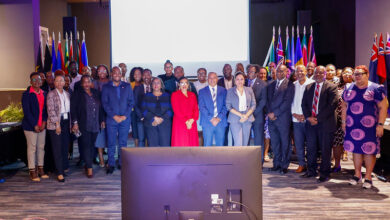The Caribbean Community (CARICOM) has links with the ocean that surrounds it that can be described as spiritual, cultural and economic.
The economic benefits to this Region, derived from Ocean resources, cannot be underestimated. The fishing industry, for example, is estimated to provide jobs for more than 200,000 people in the Region directly employed, either full-time or part-time. Added to this is that given most of the population in this Region has access to the Sea, it is further estimated that fish products account for on average seven per cent of the protein consumed by people in the Caribbean.
Research has indicated that relative to its size, the island population of the Caribbean is more dependent on income from tourism than that of any other part of the world, as twenty-five million tourists vacationing in the Caribbean each year, and tourism accounting for 15.5 per cent of total employment and 13 per cent of the total Gross Domestic Product (GDP).
World Oceas Days
Why do we celebrate World Oceans Day? To remind everyone of the major part the Ocean has in everyday life. They are the lungs of our planet, providing most of the oxygen we breathe. To inform the public on the impact of the human actions on the Ocean. To develop a worldwide movement of citizen, towards the Ocean. To mobilise and unite the world’s population on a project for the sustainable management of the World Ocean. They are a major source of food and medicines and a critical part of the biosphere. To celebrate together the beauty, the wealth and the promise of the Ocean.
The International Maritime Organisation (IMO) has noted that the countries of the Caribbean Region are highly dependent on shipping, which provides the backbone of trade links, both within the Region and with the wider international community most notably, since ships heading to or from the Panama Canal inevitably pass through the Caribbean Sea. Shipping also contributes significantly to the tourism sector with more than 45 per cent of world cruise shipping taking place in the Caribbean.
Added to the economic benefits, the Caribbean Region is home to several marine ecosystems of international importance. Burke and Maidens in 2004 estimated that seven per cent of the world’s coral reefs are located in the Wider Caribbean. Coral reefs, in addition to producing the beautiful white sand for beaches, also provide the critical service of shoreline protection, a role likely to increase in importance as the Region grapples with rising sea levels and more destructive storm activity as a result of global warming.
Given the economic activity generated by the Region’s oceans and the existence of several fragile ecosystems and vulneable species, this year’s World Oceans Day focus on Health Oceans Healthy Planet with a special focus on plastics pollution, is of special importance to the CARICOM Region.
Researchers have indicated that plastic constitutes approximately 90 per cent of all the trash floating on the ocean’s surface. They have also indicated that approximately one million sea birds and 100,000 marine mammals are killed annually from plastic in oceans.
The CARICOM Secretariat recognises that this Region is steward to important ocean resources that remain increasingly vulnerable to the pressures of climate change, pollution, including plastics, and unsustainable fishing practices. The Secretariat and Community institutions remain committed to ongoing collaboration with other Regional agencies, Intergovernmental organisations, Non-Governmental Organisations, Academic/Research institutions, Private Sector and Civil Society who all have an important role, to undertake activities to ensure the health of our oceans, and by extension, the health of our planet.






